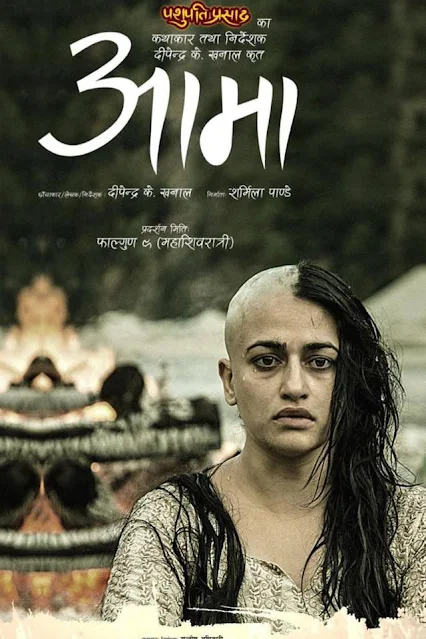A father's goodness is higher than the mountain, a mother's goodness deeper than the sea.
- Japanese Proverb
Nowadays, several incidents of hospital exploitation are reported continuously. Patients have to face a financial burden if they are admitted to the hospital. If hospitals are found to be exploiting patients, legal action should be taken, but are these hospitals being really punished for exploitation? The true scenario of hospitals in Nepal and their behaviour towards patients is clearly shown in the movie Aama.
Cast:
Mithila Sharma, Surakshya Panta, Sarita Giri, Deshbhakta Khanal, Manish Niraula, Laxmi Bhusal, Tika Pahari, Padam Prasad Poudel, Aashant Sharma, Saroj Aryal
Cast:
Mithila Sharma, Surakshya Panta, Sarita Giri, Deshbhakta Khanal, Manish Niraula, Laxmi Bhusal, Tika Pahari, Padam Prasad Poudel, Aashant Sharma, Saroj Aryal
Director:
Synopsis:
In Aama, Surakshya Panta plays Aarti, a dedicated daughter caught in the struggle between her duties as a wife, a daughter, and a woman facing societal pressures. The story begins when Aarti's father sustains a serious head injury and is rushed to a public hospital, where negligence leads her to seek treatment at a private hospital. Unfortunately, Aarti finds herself financially exploited by the hospital, which significantly burdens her already struggling family.
Aarti, a working woman from a middle-class family, is responsible for her ageing parents and in-laws. Her brother, who works abroad, is absent during this crisis. After a costly head surgery for her father, Aarti faces both mental and financial distress. Compounding her troubles, her in-laws pressure her to have a child, even suggesting that her husband marry another woman if she is infertile. Tragically, Aarti’s father dies, and the hospital refuses to release his body until the fees are paid. Aarti and her mother are left to deal with the corpse of her father, abandoned in a morgue, neglected and rotting. With no help from her brother, they are left in an unbearable situation.
Review:
Themes of Feminism and Family:
The character of Aarti stands out as a symbol of resilience, tackling not only personal and familial expectations but also societal norms that often diminish the role of women. Her struggle with infertility, alongside the constant pressure from her in-laws to conceive, is a reflection of how patriarchal expectations weigh heavily on women. Yet, Aarti refuses to be defined by her inability to bear children. Instead, she excels as a daughter, displaying immense courage and responsibility when dealing with the death of her father. Aarti’s defiant lines, such as “I’ll be a daughter first, then only will I become a mother,” and “I'm his daughter! A daughter can also perform the final ritual," emphasize her personal stance against gendered roles, especially in Hindu society where women are typically excluded from performing last rites. These words present a powerful feminist statement, asserting the equality of women in all aspects of life.
The Heartbreak of Parenthood:
The performance by Mithila Sharma as Aarti’s mother adds another emotional layer to the film. Her portrayal of a mother whose dreams and hopes are crushed by the realization that her son will not perform his father’s final rites is heartbreaking. Her lament, “Seems like our life is almost over along with hope! Now I realize it seems like everything between one’s birth and death is just an illusion,” poignantly captures the sorrow of a mother who invested everything in her children, only to be abandoned in her time of need. It reflects the disillusionment that many parents in Nepal (and globally) face as they grow older, realizing that their sacrifices have not been reciprocated.
A Reflection of Nepalese Society:
The movie shines a light on various harsh realities of contemporary Nepalese society, particularly the exploitation of patients by hospitals. The film shows how financial exploitation is rampant in healthcare, with hospitals charging exorbitant fees under the guise of medical treatment. Furthermore, the disrespectful treatment of the dead, including the hospital’s refusal to release a deceased person’s body without full payment, illustrates the lack of empathy within such institutions. The stark image of a dead body being left in a morgue, surrounded by mice, symbolizes the dehumanization of people, especially when they are unable to pay.
Exploration of Gender and Family Dynamics:
In Nepal, there is a widespread belief that sons are the primary caregivers for their aging parents. Aama subtly critiques this notion, showcasing the absurdity of such expectations. Aarti’s brother, who lives abroad, remains absent during the crucial moments, while Aarti, despite her own struggles, fulfills all the duties traditionally expected of a son. The film uses Aarti’s narrative to expose how the responsibility of caregiving is often unfairly placed on women, even when society expects men to carry this burden. This is further underscored by the subplot involving Aarti’s grandmother-in-law, who constantly taunts Aarti for not having a son, only for her own son to abandon her in her time of need.
Flaws and Weakness:
While Aama succeeds in its portrayal of familial struggles, hospital exploitation, and gender roles, one weakness lies in its focus on the hospital setting. The entire narrative unfolds predominantly within the hospital walls, which limits the film's scope and the exploration of other aspects of life in Nepalese society. Expanding the story to include broader social contexts could have provided a more nuanced understanding of the protagonist’s challenges.
Aama is an emotionally charged film that delivers a hard-hitting critique of contemporary societal and familial expectations. With its strong performances, particularly from Surakshya Panta and Mithila Sharma, and its powerful examination of exploitation and gender dynamics, the film offers a much-needed commentary on Nepalese society. The movie’s central theme—the importance of family, the exploitation of the weak, and the question of gender equality—resonates deeply with modern audiences, making Aama an impactful and thought-provoking film that demands attention.
Despite its minor flaws, the film succeeds in offering a deep emotional connection, making it a memorable and necessary watch for those who wish to better understand the complexities of Nepalese culture, healthcare, and family structures.








.png)


